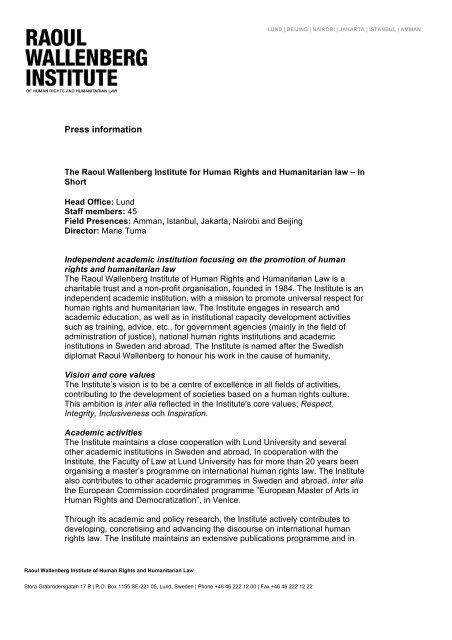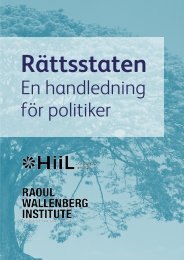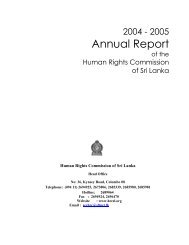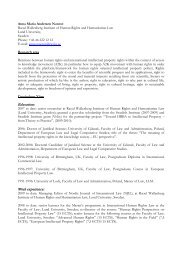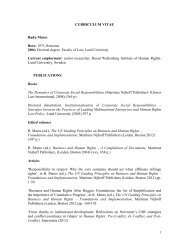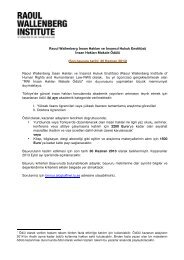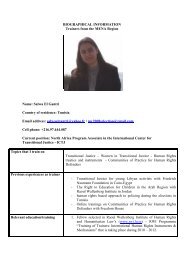press kit - Raoul Wallenberg Institute of Human Rights and ...
press kit - Raoul Wallenberg Institute of Human Rights and ...
press kit - Raoul Wallenberg Institute of Human Rights and ...
You also want an ePaper? Increase the reach of your titles
YUMPU automatically turns print PDFs into web optimized ePapers that Google loves.
Press information<br />
The <strong>Raoul</strong> <strong>Wallenberg</strong> <strong>Institute</strong> for <strong>Human</strong> <strong>Rights</strong> <strong>and</strong> <strong>Human</strong>itarian law – In<br />
Short<br />
Head Office: Lund<br />
Staff members: 45<br />
Field Presences: Amman, Istanbul, Jakarta, Nairobi <strong>and</strong> Beijing<br />
Director: Marie Tuma<br />
Independent academic institution focusing on the promotion <strong>of</strong> human<br />
rights <strong>and</strong> humanitarian law<br />
The <strong>Raoul</strong> <strong>Wallenberg</strong> <strong>Institute</strong> <strong>of</strong> <strong>Human</strong> <strong>Rights</strong> <strong>and</strong> <strong>Human</strong>itarian Law is a<br />
charitable trust <strong>and</strong> a non-pr<strong>of</strong>it organisation, founded in 1984. The <strong>Institute</strong> is an<br />
independent academic institution, with a mission to promote universal respect for<br />
human rights <strong>and</strong> humanitarian law. The <strong>Institute</strong> engages in research <strong>and</strong><br />
academic education, as well as in institutional capacity development activities<br />
such as training, advice, etc., for government agencies (mainly in the field <strong>of</strong><br />
administration <strong>of</strong> justice), national human rights institutions <strong>and</strong> academic<br />
institutions in Sweden <strong>and</strong> abroad. The <strong>Institute</strong> is named after the Swedish<br />
diplomat <strong>Raoul</strong> <strong>Wallenberg</strong> to honour his work in the cause <strong>of</strong> humanity.<br />
Vision <strong>and</strong> core values<br />
The <strong>Institute</strong>’s vision is to be a centre <strong>of</strong> excellence in all fields <strong>of</strong> activities,<br />
contributing to the development <strong>of</strong> societies based on a human rights culture.<br />
This ambition is inter alia reflected in the <strong>Institute</strong>'s core values; Respect,<br />
Integrity, Inclusiveness och Inspiration.<br />
Academic activities<br />
The <strong>Institute</strong> maintains a close cooperation with Lund University <strong>and</strong> several<br />
other academic institutions in Sweden <strong>and</strong> abroad. In cooperation with the<br />
<strong>Institute</strong>, the Faculty <strong>of</strong> Law at Lund University has for more than 20 years been<br />
organising a master’s programme on international human rights law. The <strong>Institute</strong><br />
also contributes to other academic programmes in Sweden <strong>and</strong> abroad, inter alia<br />
the European Commission coordinated programme ”European Master <strong>of</strong> Arts in<br />
<strong>Human</strong> <strong>Rights</strong> <strong>and</strong> Democratization”, in Venice.<br />
Through its academic <strong>and</strong> policy research, the <strong>Institute</strong> actively contributes to<br />
developing, concretising <strong>and</strong> advancing the discourse on international human<br />
rights law. The <strong>Institute</strong> maintains an extensive publications programme <strong>and</strong> in<br />
<strong>Raoul</strong> <strong>Wallenberg</strong> <strong>Institute</strong> <strong>of</strong> <strong>Human</strong> <strong>Rights</strong> <strong>and</strong> <strong>Human</strong>itarian Law<br />
Stora Gråbrödersgatan 17 B | P.O. Box 1155 SE-221 05, Lund, Sweden | Phone +46 46 222 12 00 | Fax +46 46 222 12 22<br />
LUND | BEIJING | NAIROBI | JAKARTA | ISTANBUL | AMMAN
cooperation with the Dutch publisher Brill, the <strong>Institute</strong> publishes several series <strong>of</strong><br />
monographs, journals, compilations <strong>of</strong> documents <strong>and</strong> educational material.<br />
The <strong>Institute</strong> has one <strong>of</strong> Northern Europe’s largest research libraries in<br />
international law, with particular focus on international human rights law <strong>and</strong><br />
related topics.<br />
Programme activities<br />
In addition to its academic activities, the <strong>Institute</strong> implements extensive<br />
programmes focusing on supporting to <strong>and</strong> developing the work <strong>of</strong> institutions<br />
<strong>and</strong> organisations to promote <strong>and</strong> protect human rights. The programmes<br />
primarily target institutions in developing countries <strong>and</strong> countries in transition.<br />
Cooperation with academic institutions, institutions in field <strong>of</strong> the administration <strong>of</strong><br />
justice, <strong>and</strong> national human rights institutions are in particular focus for RWI’s<br />
international programmes, which are mainly financed by the Swedish<br />
International Development Cooperation Agency (Sida).<br />
Through its work with both academic activities <strong>and</strong> programme activities, the<br />
<strong>Institute</strong> has a unique platform where theory <strong>and</strong> practice can be combined. This<br />
combination promotes synergy effects between the two activity areas which<br />
contribute to even further strengthening the application <strong>of</strong> international human<br />
rights law.<br />
Networking<br />
In addition to the close cooperation with Lund University, the <strong>Institute</strong> maintains<br />
relations with other academic institutions, international organisations, government<br />
agencies <strong>and</strong> civil society organisations. The <strong>Institute</strong> is member <strong>of</strong> several<br />
Nordic, European <strong>and</strong> international networks within the framework <strong>of</strong> its m<strong>and</strong>ate.<br />
Restrictions in the Scope <strong>of</strong> Activities<br />
The <strong>Institute</strong>’s activities do not include monitoring <strong>of</strong> state compliance in the<br />
human rights field or any other activities that could be interpreted to be <strong>of</strong><br />
confrontational character. The activities <strong>of</strong> the <strong>Institute</strong> are <strong>of</strong>ten implemented in<br />
cooperation with <strong>and</strong> upon request from governments, public authorities <strong>and</strong><br />
other institutions <strong>and</strong> are characterised by a constructive dialogue. This dialogue<br />
is based on the international system for the promotion <strong>and</strong> protection <strong>of</strong> human<br />
rights, which has been developed by the international community <strong>and</strong> contains a<br />
vast number <strong>of</strong> st<strong>and</strong>ards that states have undertaken to comply with.<br />
Furthermore, the <strong>Institute</strong> does not h<strong>and</strong>le individual complaints regarding<br />
alleged human rights violations.<br />
Board <strong>of</strong> Directors<br />
The <strong>Institute</strong> has a Board <strong>of</strong> Directors consisting <strong>of</strong> ten members. The current<br />
chairman <strong>of</strong> the Board is Ambassador Hans Corell.<br />
Press contacts<br />
For questions, interviews, photos <strong>and</strong> information – please contact:<br />
Marie Tuma, Director <strong>of</strong> the <strong>Raoul</strong> <strong>Wallenberg</strong> <strong>Institute</strong><br />
2
Phone: + 46 46 222 12 63, Mobile: + 46 70 350 3234<br />
E-mail: marie.tuma@rwi.lu.se<br />
For more information – visit: www.rwi.lu.se<br />
3
More about the <strong>Raoul</strong> <strong>Wallenberg</strong> <strong>Institute</strong>’s activities<br />
Research <strong>and</strong> academic education<br />
Research is a fundamental part <strong>of</strong> the <strong>Institute</strong>’s activities. In addition to its<br />
employed researchers, the <strong>Institute</strong> also provides the opportunity for guest<br />
researchers to spend a limited time at the <strong>Institute</strong> in order to research in human<br />
rights <strong>and</strong> related topics. RWI’s ambition is to carry out academic research as<br />
well as policy research <strong>of</strong> high quality in a Swedish as well as in an international<br />
perspective. Ongoing research projects are presented on the <strong>Institute</strong>’s website.<br />
The Faculty <strong>of</strong> Law at Lund University has, since more than 20 years back, in<br />
close cooperation with the <strong>Institute</strong>, been implementing master’s programme in<br />
international human rights law. The programme runs over two years providing the<br />
students with in-depth knowledge in international human rights law <strong>and</strong><br />
humanitarian law. Within the framework <strong>of</strong> this programme, students who so<br />
wish, are provided with the opportunity to specialise in intellectual property rights<br />
law or international labour law. The programme is open for foreign students <strong>and</strong><br />
since the beginning <strong>of</strong> the programme, approximately 130 students from<br />
developing countries have graduated from the programme with scholarships<br />
provided by the <strong>Institute</strong> through funding from Sida.<br />
Within the framework <strong>of</strong> its international programme activities, the <strong>Institute</strong><br />
contributes to initiating <strong>and</strong> developing academic human rights education in other<br />
countries. One example is the research direction in human rights at postgraduate<br />
level at Peking University, where the <strong>Institute</strong> also has a visiting<br />
pr<strong>of</strong>essor.<br />
Programme Activities<br />
With funding from primarily Sida, the <strong>Institute</strong> implements extensive programmes<br />
aimed at advancing the practical application <strong>of</strong> human rights <strong>and</strong> humanitarian<br />
law. The programmes primarily target state agencies in the field <strong>of</strong> administration<br />
<strong>of</strong> justice, academic institutions <strong>and</strong> national human rights institutions in<br />
developing countries <strong>and</strong> in countries in transition. The programmes are in most<br />
cases long-term commitments implemented over several years. They include<br />
building <strong>and</strong> developing knowledge, skills <strong>and</strong> tools aimed at strengthening<br />
institutional capacity to promote, respect, protect <strong>and</strong> fulfill human rights in line<br />
with the state’s international commitments.<br />
The international system for human rights provides the basis for the activities,<br />
which are implemented on regional as well as on bilateral level. Education <strong>and</strong><br />
training, curricula development, literature support, opportunities for networking<br />
<strong>and</strong> exchange, support to the establishment <strong>of</strong> resource centres <strong>and</strong> advice in<br />
management <strong>and</strong> organisational matters are all important components generally<br />
<strong>of</strong> the programmes.<br />
The <strong>Institute</strong> is carrying out programme activities in Africa, Asia, the Middle East,<br />
<strong>and</strong> Europe. In addition to the activities carried out from the <strong>Institute</strong>’s head <strong>of</strong>fice<br />
in Lund programmes are also implemented from the <strong>Institute</strong>’s <strong>of</strong>fices abroad,<br />
which are based in Amman, Beijing, Istanbul, Jakarta och Nairobi. The<br />
4
programmes are developed <strong>and</strong> implemented in close cooperation with local<br />
partners.<br />
During the 20 years that the <strong>Institute</strong> so far has been implementing international<br />
programmes there are many positive results.<br />
• Out <strong>of</strong> the approximately 130 students from developing countries who have<br />
been awarded scholarships for attending the master’s programme in<br />
international human rights law in Lund, the vast majority are today in different<br />
ways working with human rights within state agencies, international<br />
organisations, universities or other academic institutions <strong>and</strong> civil society<br />
organisations.<br />
• In 2004, the <strong>Institute</strong> supported the establishment <strong>of</strong> the first academic<br />
programme in human rights at post-graduate level in China. The support<br />
provided by the <strong>Institute</strong> to Chinese academic institutions in general over the<br />
last ten years has contributed to the number <strong>of</strong> university human rights<br />
courses in China increasing from a h<strong>and</strong>ful to around 90 today.<br />
• The <strong>Institute</strong> has over the last 15 years strengthened the capacity <strong>of</strong> more<br />
than 20 national human rights commissions in Africa <strong>and</strong> Asia, thus<br />
strengthened these institutions’ capacity to promote <strong>and</strong> protect human rights.<br />
• Through the work <strong>of</strong> the <strong>Institute</strong>, human rights has been further incorporated<br />
into the education <strong>and</strong> training for correctional <strong>of</strong>ficers in Indonesia as well as<br />
in Kenya with the aim to ultimately strengthen the protection <strong>of</strong> the rights <strong>of</strong><br />
persons deprived <strong>of</strong> their liberty.<br />
These are but a few <strong>of</strong> the many results achieved through RWI’s international<br />
programmes <strong>and</strong> which have been possible due to the <strong>Institute</strong>’s long-term <strong>and</strong><br />
confidence-building work on the basis <strong>of</strong> a combination <strong>of</strong> theory <strong>and</strong> practice in<br />
the area <strong>of</strong> human rights.<br />
Library<br />
The <strong>Institute</strong> maintains one <strong>of</strong> Northern Europe’s largest research libraries in<br />
international law, with emphasis on international human rights law <strong>and</strong> related<br />
areas. Today, the library contains approximately 30.000 volumes <strong>and</strong> with this<br />
collection <strong>and</strong> a growing access to electronic material, the library is an invaluable<br />
resource for researchers, teachers <strong>and</strong> students. The library is a reference library<br />
<strong>and</strong> is also open to the public.<br />
About <strong>Raoul</strong> <strong>Wallenberg</strong><br />
The <strong>Institute</strong> is named after <strong>Raoul</strong> <strong>Wallenberg</strong>, the Swedish diplomat <strong>and</strong><br />
humanitarian who during later stages <strong>of</strong> the 2nd world war rescued tens <strong>of</strong><br />
thous<strong>and</strong>s <strong>of</strong> Jews in Nazi-occupied Hungary from the Holocaust. On January<br />
17, 1945, in connection with meeting with the approaching Soviet Red Army<br />
<strong>Raoul</strong> <strong>Wallenberg</strong> was detained by Soviet authorities <strong>and</strong> subsequently<br />
disappeared. Although several speculations <strong>and</strong> investigations, until today his<br />
fate remains unknown.<br />
<strong>Raoul</strong> <strong>Wallenberg</strong>’s name is immediately associated with outst<strong>and</strong>ing individual<br />
courage, humanity <strong>and</strong> decisiveness <strong>and</strong> for the <strong>Institute</strong> it is an honour to bear<br />
his name <strong>and</strong> to work in his spirit.<br />
5


